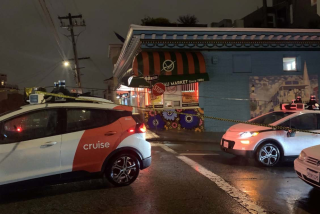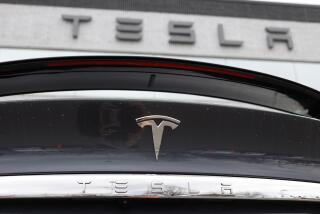FBI Examining TRW Missile Test Fraud Allegation
- Share via
WASHINGTON — The FBI is looking into allegations that defense giant TRW was guilty of fraud and cover-up in developing a key component of the controversial national missile defense program, according to a letter from an FBI official made public Monday.
Responding to a request from 53 House members, FBI official Thomas T. Kubic said he had asked for an FBI review of whistle-blowers’ allegations that TRW faked test results in developing a prototype “kill vehicle” for the antimissile system. Kubic, deputy assistant director of the FBI’s criminal investigative division, wrote in a July 31 letter that he had asked FBI officials to review whether federal law had been broken.
The letter was released by Rep. Dennis J. Kucinich (D-Ohio), a missile defense foe who has sought to bring public attention to the allegations. He and 52 other House members have sent a letter to the FBI urging an investigation.
Federal investigative agencies often look into allegations at the direction of Congress, and it was not clear from the letter whether the FBI believes this matter merits a full investigation, which would be the next step after a review. An FBI spokeswoman, Heather Hobson, said the bureau would neither confirm nor deny that an investigation is underway.
The “kill vehicle” is a component of the proposed antimissile system that would be lifted into space on the nose of an interceptor missile. It is supposed to use infrared and optical sensors, and small rockets, to find the enemy warhead and collide with it to destroy it.
Nira Schwartz, a TRW senior engineer in 1995 and 1996, has alleged that TRW fudged flight test data to conceal that a “kill vehicle” it developed was unable to pick out warheads from the decoys that an enemy would send into space with them to throw off defenders. Fired by TRW, she sued the company in 1996; the suit is pending.
This year, she was joined by Theodore A. Postol, an MIT physics professor and a former government science advisor, in trying to win greater public attention for the issue.
Kubic’s letter was first reported by Defense Week, a trade publication.
TRW’s prototype kill vehicle lost out in a competition to a rival system, developed by Raytheon. But Postol contends that the same design flaws would be present in any such kill vehicle, and would render the multibillion-dollar missile shield worthless. He said in an interview that if the allegations are proved “it ought to be enough to cause a complete and comprehensive review of the program.”
A TRW spokesman, Jay McCaffrey, said TRW has already been investigated by the Army, the Defense Criminal Investigative Service and the Pentagon’s missile defense program office.
“We have been found by many government agencies to have acted appropriately, and we’re confident that any new investigation will once again validate TRW’s work on this project,” McCaffrey said.
He said that the company was unaware of any FBI investigation, but would cooperate if asked.
The General Accounting Office, the investigative arm of Congress, is also looking into the allegations.
The Defense Criminal Investigative Service, after a review of the allegations, recommended a further review in 1997. In 1998, a Pentagon advisory board disagreed and defended TRW’s work.
Though TRW’s kill vehicle lost out to a rival, the company remains deeply involved in the national missile defense project.
It is developing a “battle management” system, which would integrate the sensors and interceptor missiles so they can work in concert.
TRW Space & Electronics Group, based in Redondo Beach, is competing to build a constellation of about 24 satellites, called Space Based Infrared Systems Low. This network, scheduled to be deployed no earlier than 2006, is key to its ability to track larger numbers of attacking missiles.
More to Read
Inside the business of entertainment
The Wide Shot brings you news, analysis and insights on everything from streaming wars to production — and what it all means for the future.
You may occasionally receive promotional content from the Los Angeles Times.










